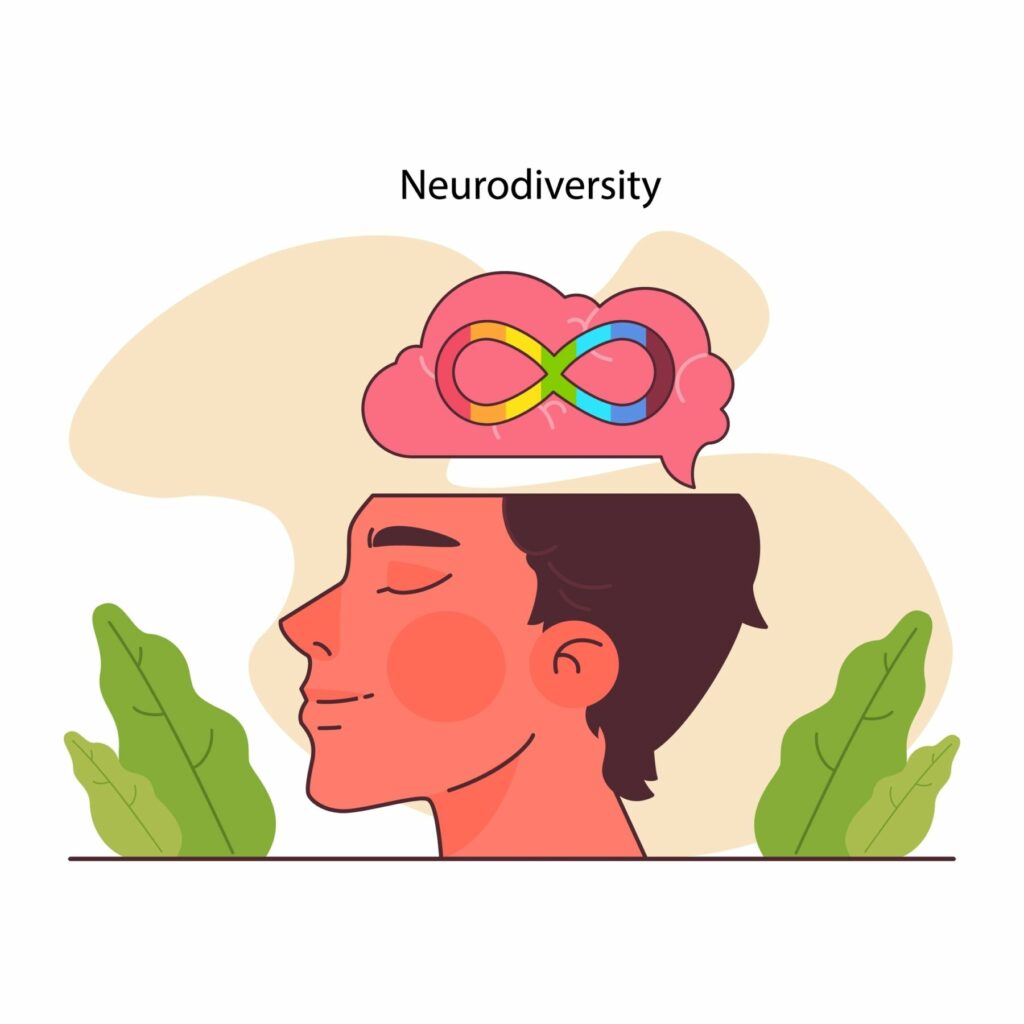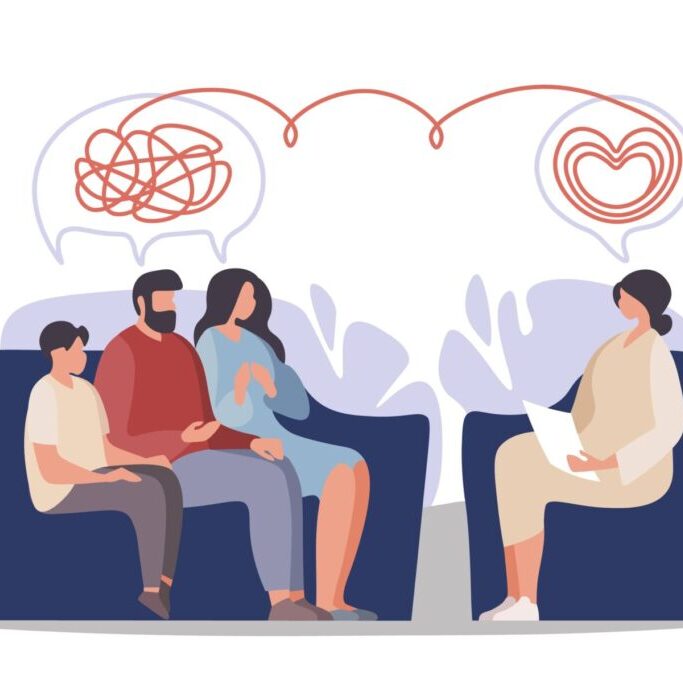How Neurodiversity Affirming Therapy Can Help

For many years the medical model has pathologized variations in the way the human brain works. The construct of neurodiversity, and the movement around it, attempt to correct that error. But what is it?
Neurodiversity is a clinical term used to describe the different varieties of human neurology. Common diagnoses used to describe neurodiverse people include Autism, ADHD, dyslexia, trauma, and anxiety. And, it’s catching on.
The construct of neurodiversity, while not without resistors, has become much more recognized as a condition that impacts many people across the world.
What is Neurodiversity Affirming Therapy?
Neurodiversity affirming therapy is a type of therapy that seeks to empower individuals who experience different neurological conditions. Historically, neurodiversity therapy has revolved around coaching and training neurodiverse individuals to behave like neurotypical (e.g., non-neurodiverse) people, encouraging masking and hiding atypical behaviors.
Neurodiversity therapy takes the approach that these neurological conditions have unique strengths and abilities rather than deficiencies. Having an affirmative, strengths-based approach to neurodiversity ensures that clients will feel comfortable and accepted in a therapeutic setting.
Key Principles of Neurodiversity Affirming Therapy
Let’s examine some key features of neurodiversity affirming therapy.
- Acceptance and Celebration – Neurodiversity therapy takes the approach of accepting neurodiverse clients exactly as they are while also celebrating their unique experiences. There is a lot of stigma surrounding neurodiversity in today’s culture. Celebrating the experiences of neurodiverse individuals contributes to normalizing these various conditions.
Research has shown that negative stigma towards neurodiversity and many mental health disorders seriously discourages individuals from seeking support. By investing in acceptance and celebration, clinicians can help contribute to a more positive outlook on neurodiversity. This in turn could contribute to a less stigmatized view of neurodiversity affirming therapy and mental health which could help individuals feel more comfortable seeking out support. - Strengths Based – Neurodiversity therapy takes a strengths-based approach when working with clients. Focusing on strengths empowers clients to see their unique qualities as positive rather than as disabilities. In the same way that acceptance and celebration contribute to a more positive schema on mental health, utilizing a strength-based approach also decreases negative ideas about neurodiversity by uplifting the positive value of neurodiverse differences.
- Collaborative and Individualized – Neurodiversity affirming therapy recognizes that every individual’s experience is unique. Neurodiversity therapy recognizes it as necessary to remember that therapy is not a one-size-fits-all practice.
Collaborating with clients and individualizing treatment greatly contributes to success. Bringing clients into the process allows them to feel autonomy through treatment. Incorporating a client’s own expertise of themselves allows for a stronger and more impactful relationship. - Education and Advocacy – Neurodiversity affirming therapy promotes education and works to destigmatize these neurological conditions. Considering the negative stigma of various conditions, clients and families will likely have many questions and concerns about treatment and neurodiversity.
The education of clients and clients’ family members is an important part of treatment. Neurodiverse individuals face a lot of obstacles and advocacy is necessary in helping clients find success.
What are the Benefits?
Neurodiversity therapy contributes deeply to self-acceptance. Creating a space where individuals are free to explore their identity without shame helps develop a positive self-image. This also encourages fully embracing individuals’ unique strengths. Other benefits include improved emotional well-being, enhanced relationships, and autonomy.
By focusing on strengths, neurodiversity therapy encourages individuals to more effectively cope with challenges and develop strategies for overcoming adversity. Neurodiversity affirming therapy empowers individuals to pursue goals with confidence as active participants in their own lives.
The strength-based approach also views the qualities of neurodiverse individuals as natural variations of the human brain. Unlike common therapeutic approaches that aim to change thoughts and behaviors, Neurodiversity affirming therapy emphasizes acceptance and collaboration. The overall goal is not to reduce symptomatology but to promote self-acceptance, well-being, and empowerment for neurodiverse individuals.
Historically, therapeutic approaches towards neurodiversity have been somewhat harmful in that they focus on deficits and changing behavior rather than promoting acceptance. Approaching treatment that improves skills rather than behavior can be empowering for clients.
Neurodiversity affirming therapy can include strategies to improve skills and confidence in speech and communication, play, developing social skills, gross motor skills, fine motor skills, self-care skills, and regulating sensory and emotional reactions. By focusing on acceptance, strengths, and the reported distress by clients, therapists can support clients in optimizing daily function at school, work, home, and socially.
Finding a Neurodivergent Therapist
Seeking out a therapist is always a challenging task. It’s important in this process to know what it is that you want to approach in therapy. When it comes to neurodiversity affirming therapy, it is important to find a therapist who has experience working with neurodiverse clients.
Fortunately, Chicago has increasingly become a hub for progressive mental health practices, including neurodiverse affirming therapy. Amid the city’s bustling neighborhoods, such as Lakeview, therapists, and clinicians gather for events like the annual Chicago Autism Network Conference and neurodiversity celebrations in Millennium Park, fostering a supportive community for neurodiverse individuals.
These events not only offer invaluable resources and networking opportunities but also underscore Chicago’s commitment to inclusivity and mental health advocacy. By embracing neurodiverse affirming therapy, Chicago continues to lead in creating environments where neurodiverse individuals can thrive and find acceptance.
If you or a loved one are seeking compassionate, tailored support that embraces neurodiversity in Chicago, look no further than Tandem Psychology. Our dedicated team of professionals is committed to providing neurodiversity affirming therapy, ensuring that your unique experiences and strengths are recognized and celebrated.
We understand the importance of finding a therapist who truly gets you, and at Tandem Psychology, we strive to create a safe, inclusive space for all our clients. Take the first step towards a more understanding and supportive therapeutic journey by contacting us today. Your well-being is our priority, and we are here to walk with you every step of the way.
This blog is made for informational and educational purposes only. It is not medical advice. The information in this blog is not intended to (1) replace a one-on-one relationship with a qualified licensed health care provider, (2) create or establish a provider-patient relationship, or (3) create a duty for us to follow up with you.



